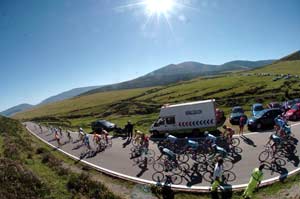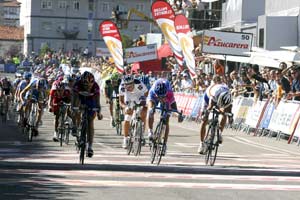 |
With all three podium finishers from 2006 absent from the 62nd Vuelta a Espana, you could be forgiven for thinking that the general apathy that surrounds the final Grand Tour of the year would be justified, but far from it.
We have witnessed a returning Alessandro Petacchi sold short by team mate Erik Zabel and outgunned by Danniele Bennati, a three time former World Champion finally get his hands on a leader’s jersey in a Grand Tour, the current World Champion show he has the fitness and determination to defend his rainbow bands in a month and one of a pair of cycling twins finally come of age at the top of a mist covered mountain. Now how could that possibly be dull?
Over the last decade, Unipublic, the organisers of the Vuelta, have consistently attempted to boost interest in their race with, in my opinion, great success, but still Thomas Voeckler’s win at the GP Plouay commanded ten times the column inches devoted to the Vuelta in the Monday edition of l’Equipe. Shorter stages, vicious mountains and beautiful finishing towns all make the Vuelta as characterful and exciting as the other two Grand Tours and yet, outside of the Iberian peninsula, the event consistently fails to get pulses racing.
So why is this great race, steeped in epic performances and with enough social and political history to keep cultural analysts happy for a lifetime, so sorely undervalued?
There was a time when moving the Vuelta to an Autumn slot away from its original late spring date seemed a good idea, until the UCI moved the World Championships to the current slot just one week after the finish of the Vuelta. In theory this should make the race the ideal tune-up time for those with aspirations to be World Champion, but somehow that implies that this tour plays second fiddle to the World’s. It will be even worse next year, when the inevitable focus on the Beijing Olympics, which precedes the Vuelta, will mean the race may hardly even get a look in.
 |
But there is more to it than timing. The event is brought to an international audience via television and from a professional point of view the quality of the images beamed across the world can sometimes be dire. More than once this week I have given the broadcaster a full verbal broadside on air for failing to employ a moto cameraman who can get a shot in focus.
Added to its timing and technical shortcomings, the Vuelta has never boasted crowds to match those of the Giro and the Tour. Understandable, given that much of the centre of Spain consists of hot, arid plain with little life in between. It’s hardly conducive to the roadside picnic beloved of the French and the paucity of spectators always reflects badly on the race itself.
Finally, the events surrounding Operation Puerto just confirmed what many already suspected, which was that Spain had become a safe haven for those wishing to flout ethics and undertake ‘medical’ preparation for races, including sadly, the Vuelta itself.
However, look deeper at the Vuelta and you’ll find a race with more social significance that perhaps the other two Grand Tours put together.
In the 70 years that the Vuelta a España has existed, it has survived a civil war, four decades of dictatorship, periods of economic and diplomatic isolation, desperate years when the country was close to famine, disruption through political violence and finally the restoration of democracy and the country’s entry into the European Community.
It has also been a ‘must have’ on the palmares of many a Tour and Giro winner over its lifetime; men like Anquetil, Merckx, Gimondi, Hinault and Ullrich have all carried home the winner’s jersey to add to their collection.
So, park your cynicism over doping for 3 weeks, revel in the endless vistas of olive groves ringed by gigantic mountains and allow the unique culture and history of this great race to wash over you and discover that the Vuelta is so much more than just ‘the other tour’.





